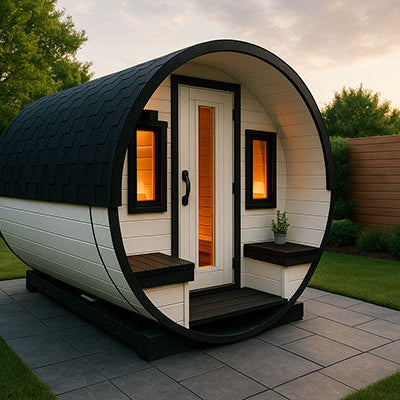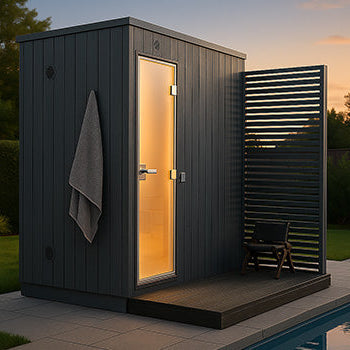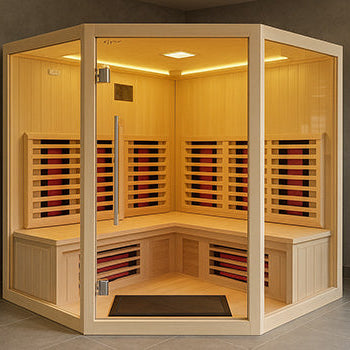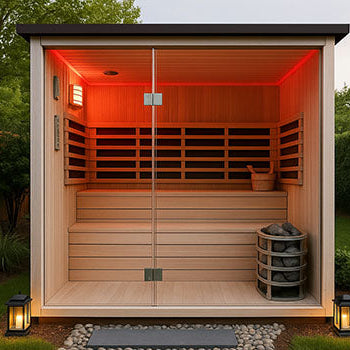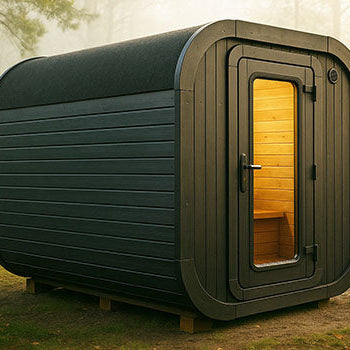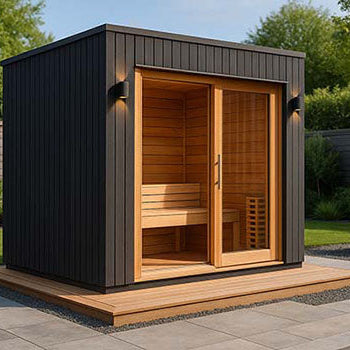Wondering if saunas are good for your blood pressure? Absolutely! Imagine unwinding under the stars in your backyard sauna or relaxing indoors after a long day. Either way, regular sauna sessions can give your heart a healthy boost. Ready to find out how something as simple as heat could help your cardiovascular system? Grab your towel, kick back, and let's jump right in!

Saunas and Blood Pressure: Understanding the Connection
How Sauna Heat Impacts Your Cardiovascular System
Stepping into a sauna feels like a warm hug—but it's much more than just relaxation. The heat causes your blood vessels to widen (vasodilation), letting your blood flow more freely and easily. Your heart rate gently speeds up, mimicking mild exercise without even breaking a sweat (ironic, right?). Over time, this simple process can strengthen your heart and make your blood vessels more flexible, which is great news for overall heart health.
Defining High Blood Pressure (Hypertension) and Low Blood Pressure (Hypotension)
High blood pressure (hypertension) happens when blood pushes too hard against your artery walls, like water rushing through a garden hose under too much pressure. This can lead to serious heart issues. On the flip side, low blood pressure (hypotension) means blood flow is too slow, leaving you feeling dizzy or faint. Knowing where your blood pressure stands helps you manage it better—especially if you're hitting the sauna regularly.
Potential Long-Term Benefits for Blood Pressure Regulation
Insights from Research on Regular Sauna Use (Finnish Studies)
Finns are famous for their sauna rituals, and now science is backing up their traditions. Studies from Finland found that people who used saunas 4-7 times per week had noticeably lower blood pressure and fewer heart problems compared to infrequent sauna users. It seems those regular sauna visits might be more beneficial than we realised—turning a relaxing habit into a healthy heart routine!
Mechanisms: Improved Blood Vessel Function and Relaxation
Regular sauna visits help your blood vessels stay flexible and relaxed, improving blood circulation throughout your body. Plus, saunas offer an amazing escape from stress, reducing the hormones that often drive blood pressure up. Think of it as giving your arteries a much-needed spa day, resulting in better cardiovascular health overall.
Short-Term Effects and Potential Risks During/After Sauna Use

Temporary Blood Pressure Drops and the Risk of Hypotension
After a relaxing sauna session, you might notice a bit of dizziness—especially when standing up quickly. This happens because heat expands your blood vessels, causing a temporary dip in blood pressure. While usually harmless, always take your time standing up after your session to avoid any wobbly moments.
Considerations for Orthostatic Hypotension (Dizziness/Fainting)
If you've ever stood up fast and felt your vision blur, you've experienced orthostatic hypotension. Saunas can amplify this feeling because the heat affects your blood pressure more dramatically. Stay hydrated, limit your sauna sessions to shorter intervals, and listen carefully to your body’s signals.
The Impact of Rapid Cooling (e.g., Cold Plunges)
Jumping into a cold pool right after the sauna might sound exhilarating, but rapid temperature shifts can sharply raise your blood pressure. Cold water quickly tightens your blood vessels after the heat has expanded them. If you have heart concerns, go easy on the cold plunges—or better yet, ask your doctor first.
Important Advice for Individuals with Blood Pressure Concerns
Using Saunas with Existing High Blood Pressure (Hypertension)
If you're managing hypertension, sauna sessions can be beneficial—but take precautions. Start with short sessions to gauge how your body reacts, and gradually increase your time as you feel comfortable. Always keep an eye on your blood pressure and regularly consult with your healthcare provider to stay safe.
Using Saunas with Low Blood Pressure (Hypotension)
Those with naturally low blood pressure should be cautious, as sauna sessions can increase dizziness risks. Keep sessions short, drink plenty of water, and consider lying down during your sauna time. This helps maintain stable blood pressure and reduces the chance of feeling faint.
Interactions with Blood Pressure Medications
Certain medications for managing blood pressure can amplify the effects of sauna heat. If you're on medication, always chat with your doctor first to ensure that sauna use fits safely into your wellness routine.
Safe Sauna Practices and When to Consult a Doctor
Key Safety Tips (Hydration, Moderation, Listening to Your Body)
Always keep yourself hydrated—drink water before, during, and after your sauna session. Moderation is crucial; begin with short visits of around 5-15 minutes, and gradually build up. Listen to your body closely, and if you feel uncomfortable or dizzy, step out immediately and rest.
Why Medical Advice is Essential Before Starting
Everyone’s health is unique, so what works perfectly for someone else might not be right for you. If you have existing heart conditions or take medications, it's important to speak with your healthcare provider first. Professional advice ensures your sauna experience remains safe, relaxing, and beneficial.
Conclusion: Balancing the Benefits and Risks for Your Blood Pressure

Saunas provide impressive potential benefits for managing blood pressure and boosting heart health. But balancing these benefits with sensible precautions is key. By staying informed, being careful, and consulting health professionals, you can safely enjoy regular sauna sessions and help your heart thrive.







